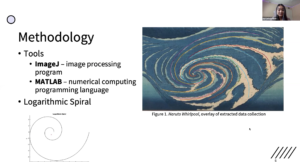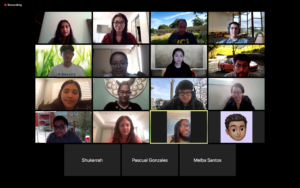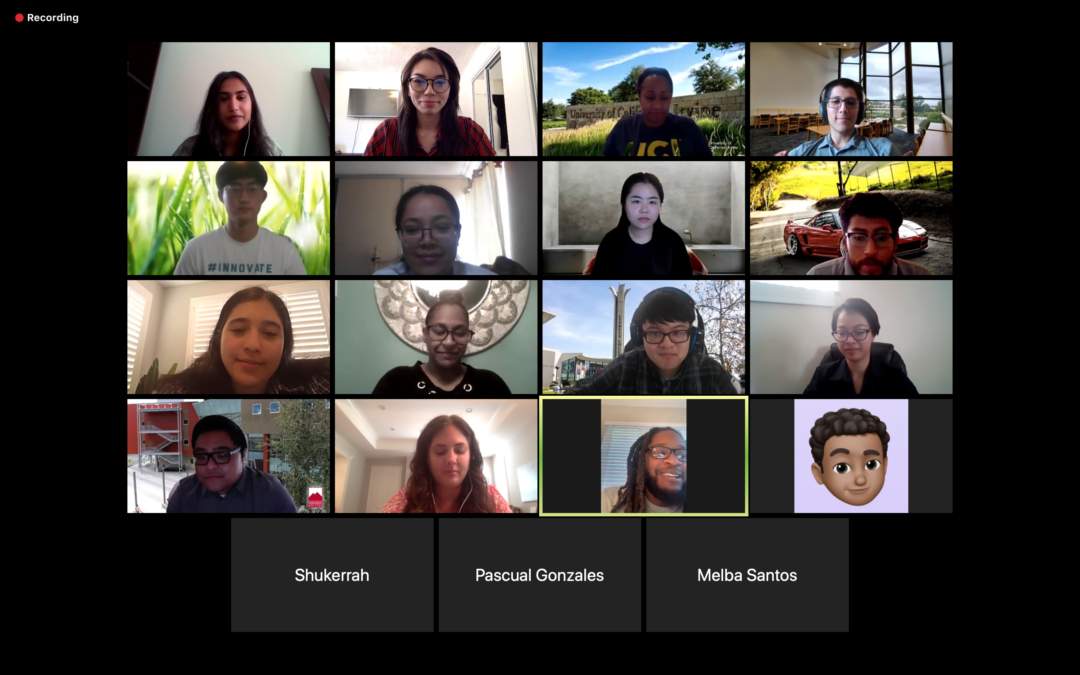By Jade Kim, Student Success Specialist at Base 11
The first day of a fellowship is often filled with excitement and nervousness, from the moment you wake up and get ready, to the moment you finally step out the door to your…living room? In the age of COVID-19, classrooms have been replaced with Zoom rooms and face-to-face interaction now occurs exclusively through a computer screen. For the 2020 Base 11 Summer Fellowship program, traditionally characterized by its experiential, hands-on approach, university partners had the unique challenge of bringing its intensive, weeks-long courses into an entirely virtual landscape that ensured students gained the full experience without leaving their homes.
Both summer programs, the Autonomous Systems Engineering Academy at UCI and the Aerospace Mentorship Program at Caltech, had already fully transitioned their programs online after campuses first shut down in early Spring, so this wasn’t their first rodeo, so to speak. Faculty and mentors worked with the students to make this year’s Base 11 Summer Fellowship as immersive and engaging as possible in a virtual setting.

Screenshot of Caltech Fellow Victoria Ignacio’s Final Project
Despite not having access to traditional university campus resources like labs and physical equipment, students were still able to devise and cleverly execute their individual research projects using various tools at home. For instance, Cypress College’s Victoria Ignacio, whose project was inspired by the intersection of science and art, was able to analyze the depiction of vortex flows in various Asian artworks dating back as far as the 13th century using software-based applications MATLAB and ImageJ.
When the fellows weren’t learning how to program in Python or analyze various data sets, they were also honing their “soft” skills, like communication and collaboration, otherwise know as the STEM 2.0 skills needed to be successful in an increasingly competitive job climate.
“I learned how to communicate with others and share ideas. Not knowing something isn’t shameful; everyone is a beginner when they learn material for the first time. I learned that what matters is how much time and effort you put into it,” said Santa Monica College’s Justin Hong, a UCI Summer Fellow who recently transferred to the Georgia Institute of Technology.
“I felt like I progressed so much in my communication skills, and that this experience will be beneficial towards every aspect of my life. I now have a support system and possibilities given to me by the networks and connections that I was given access to in this internship,” said Saddleback College’s Kenneth Casimiro, a UCI Summer Fellow.
Facilitating the lessons of the fellowship wasn’t the only challenge; students also had to adapt to working with their teams in an exclusively virtual environment. Thanks to technology however, the fellows were still able to discuss and collaborate in real-time.

Screen shot of the 2020 UCI Summer Fellowship cohort
“When we are struggling with a topic, we all help each other via Zoom chat,” said Riverside Community College’s Cynthia Roman, a UCI Summer Fellow.
“The other students are great to work with and they are as eager to learn as I am. They are super respectful towards others in the group, which makes it better for me to work with them,” said Santa Monica College’s Melissa de la Cruz, a UCI Summer Fellow.
Of course, a Base 11 Summer Fellowship would not be complete without the guidance from the university mentors, who play an integral role in the program by closely helping the students with everything from learning new concepts to advice on transferring to a university.
“The mentors are great. They never leave a single person behind. I was able to fix all the problems I had thanks to the support from the mentors,” said Santa Monica College’s Justin Hong, a UCI Summer Fellow.
Both programs successfully concluded with each of the fellows giving impressive final presentations of their research projects, a clear testament to how much they have learned and grown during the experience.
While virtual learning certainly poses its challenges, these students were still able to walk away with a meaningful experience that hopefully one day lead them towards the career of their dreams.
“I gained a larger perspective, grew patience, and now have an increased capacity for perseverance, which gives me the power to go through the problems without giving up. Now, I am excited and ready to face challenges and learn new materials,” said Hong, who is interested in developing software for autonomous vehicles with the ultimate goal of making a more equal and connected world.
“As a returning student who is older than most of his peers, my family is proud of my achievement. This experience showed that I have what it takes to be successful in a STEM major. As a first-generation Filipino-American, my mom is so proud that her son will eventually become an engineer,” said Casimiro, who wants to use his future degree in computer engineering to work on projects that “move the human race towards space.”
Although the immediate future of traditional campuses remains uncertain, the Base 11 Summer Fellows look forward to a bright and promising trajectory.
“After the internship, I can possibly see myself going to a graduate school a few years after I complete my Bachelor’s. Because of the skills that I have learned in this internship, I can also see myself having better opportunities getting an internship or a job in the aerospace industry,” said Cerritos College’s Jonn Luizze Cruz, a Caltech Summer Fellow who now interns at NASA. Cruz aspires to help design rockets and spacecrafts that will one day land on Mars.
“I now see myself being accepted into the university of my dreams,” said Santa Monica College’s Jacqueline Castellanos, a Caltech Summer Fellow.
For more information on Base 11 programs, click here.

